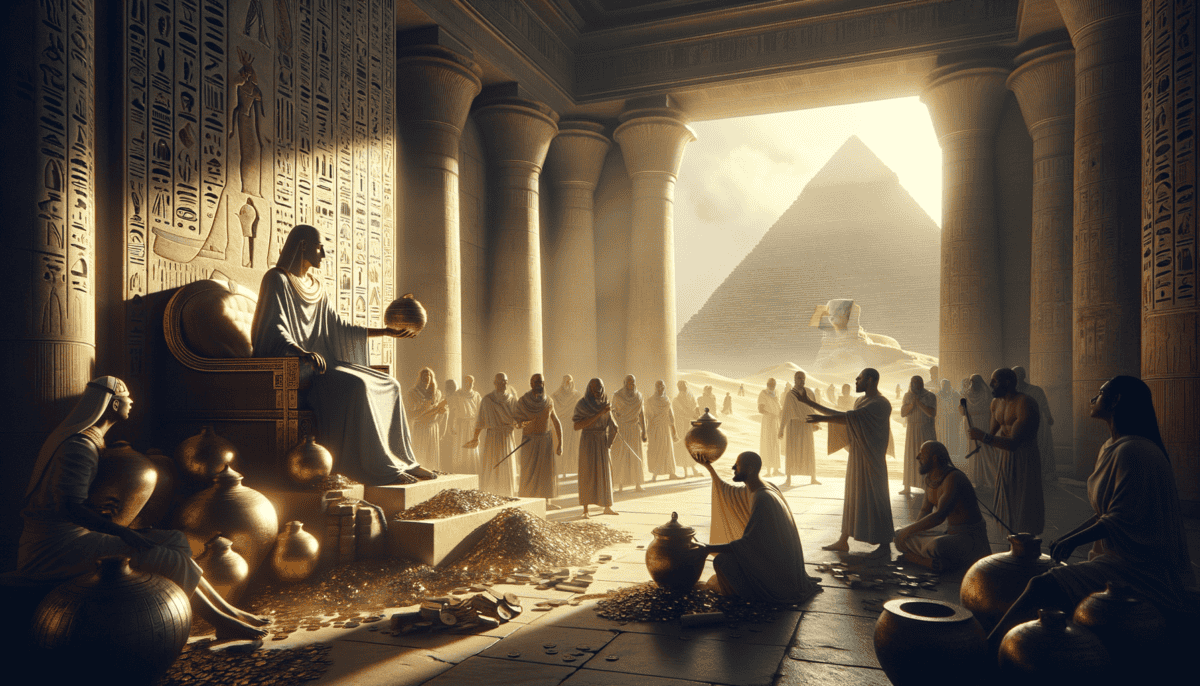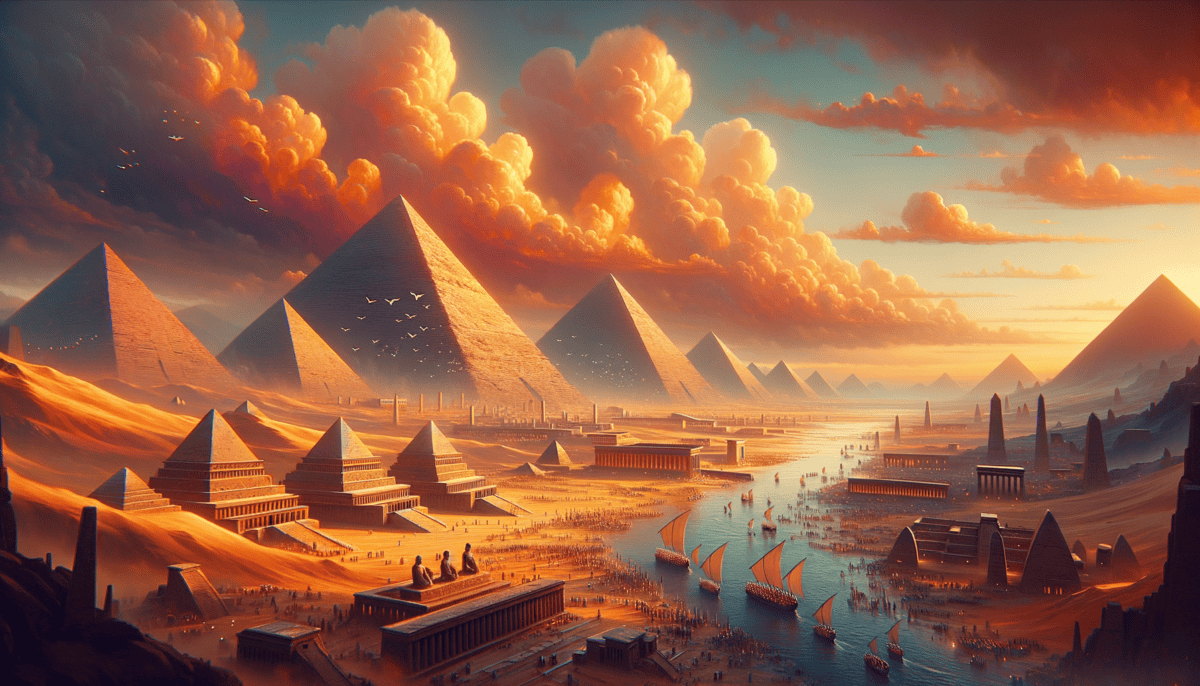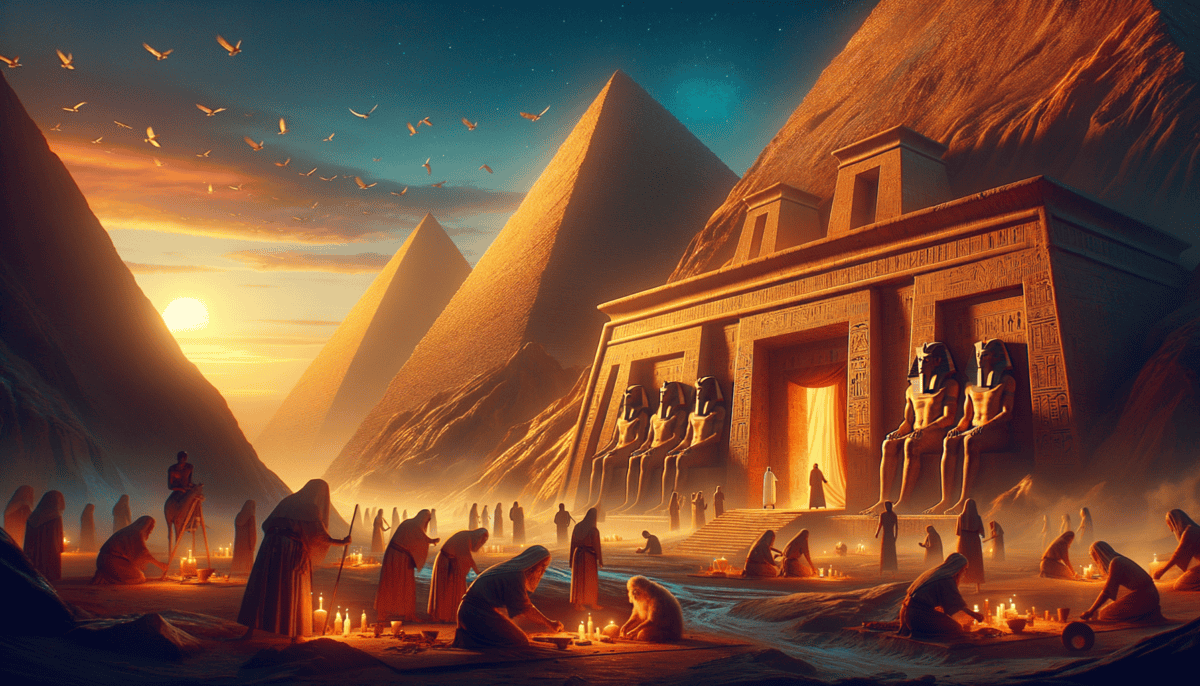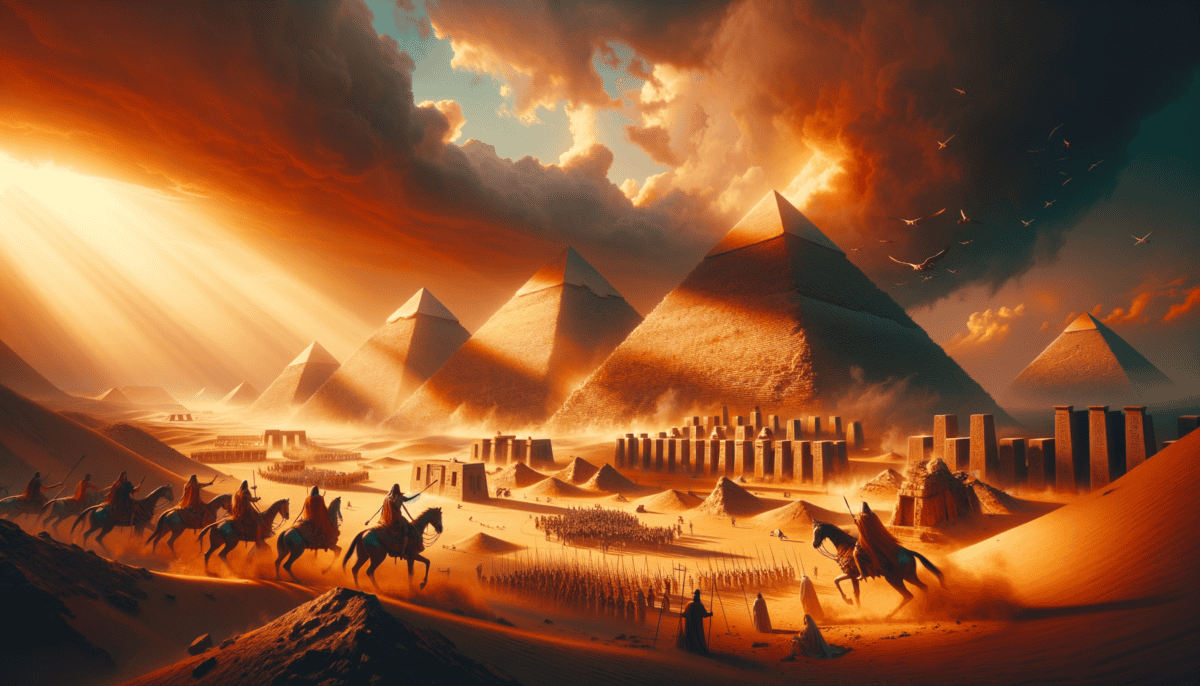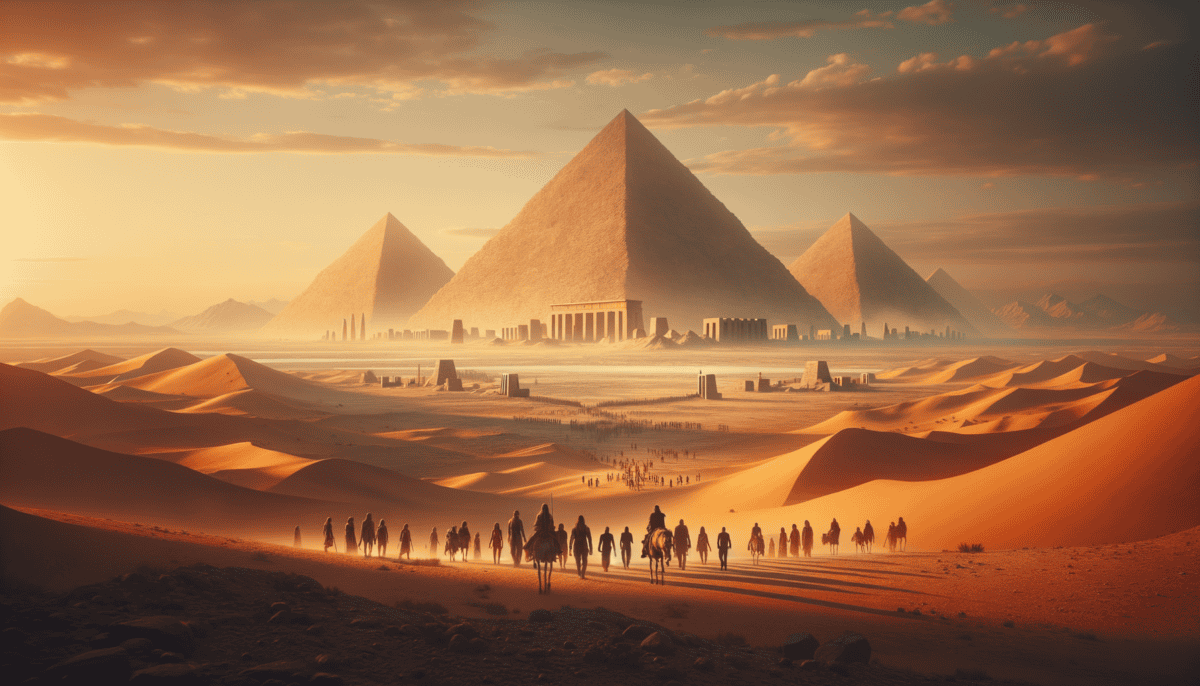The Golden Age of Pyramids
Long, long ago in Egypt, people built amazing pyramids that touched the sky! These huge buildings were like giant triangle-shaped castles made of stone. They were so big, you could see them from far away!
The story of these pyramids begins with a very special king named Khufu. He wanted to build the biggest and best pyramid ever! Khufu was what they called a Pharaoh – that's like being a king and superhero all in one.
"We need to build something amazing!" Khufu told his helpers. "Something that will last forever!"
The helpers worked very hard. They were like a giant team of builders. Some people cut huge stones. Others pulled these stones up big ramps. It was like the biggest puzzle game ever!
Building the Great Pyramid
Building a pyramid was not easy! The workers had to:
• Cut giant stones from far away
• Move the stones across the sand
• Stack them perfectly
• Make sure everything lined up just right
The pyramids were special because they were like magical houses for the pharaohs after they died. The Egyptians thought their kings needed a super cool home in heaven. Inside the pyramids, they put lots of treasure and pretty things.
Smart Builders
The people who built the pyramids were very clever. They knew math and science better than anyone else in the world back then! They used special tools to make sure the pyramids were perfect triangles.
“Our pyramids will stand forever,” the builders would say proudly. And they were right – the pyramids are still standing today!
Every day, more and more stones went up. The pyramid grew taller and taller. People from all over Egypt came to help build it. They worked together like one big family.
When the sun set each day, the pyramid would cast a giant shadow across the sand. It was like a huge sundial telling time! The workers would look up at what they built and feel very proud.
But building pyramids was very hard work. It took lots of people, lots of time, and lots of money. Soon, things would start to change in Egypt. The time of the great pyramids wouldn't last forever…
The desert wind whispered around the mighty pyramid, carrying secrets of what was to come. Changes were coming to Egypt, changes that would end this amazing time of pyramid building.
Money Troubles in Egypt
The sun rose over Egypt, but something was different now. The big pyramid projects that made Egypt famous were starting to slow down. King Pepi II looked worried as he counted the gold in the royal treasury.
“My lord,” said the royal advisor, bowing low. “We need more gold to keep building your pyramid.”
The king frowned. “But where has all our gold gone?”
The Growing Costs
Building pyramids was getting more expensive every year. Think of it like trying to build the biggest sandcastle ever, but running out of sand! Here’s what made it so costly:
• Getting stones from faraway places
• Paying thousands of workers
• Buying tools and food
• Moving heavy blocks
• Making everything perfect
The royal treasurer shook his head sadly. “Your majesty, we used to have gold like sand in the desert. Now our treasuries are getting empty.”
Hard Choices
“Perhaps we should build smaller pyramids?” suggested one advisor. But the pharaoh didn’t like that idea at all!
Every day, more workers came asking for payment. The food stores were getting low. It was like trying to feed a whole city of hungry people!
Changes in Egypt
The pharaoh looked out at his kingdom. He could see farmers working in their fields along the Nile River. He saw boats carrying goods up and down the river. Maybe there were more important things than building huge pyramids?
Some workers started leaving the pyramid projects. They went back to their farms or found other jobs. The huge work camps around the pyramids got smaller and smaller.
“Times are changing,” sighed the old priest. “Maybe we need to change too.”
New Ways of Thinking
The pharaohs started thinking about spending their gold on different things. They built temples instead of pyramids. They helped farmers grow more food. They made their cities stronger.
But this wasn’t the only problem Egypt faced. Far away, in other parts of the kingdom, some people were getting restless. They didn’t want to send all their money to help build pyramids anymore…
As the sun set behind the half-finished pyramid, casting long shadows across the sand, nobody knew that even bigger changes were coming to the land of Egypt.
Power Shifts in Ancient Egypt
The morning sun cast long shadows across Egypt, but they weren’t just pyramid shadows anymore. In different parts of the land, local leaders called nomarchs were becoming more powerful.
“Look at my beautiful city,” said Kheti, a proud nomarch, standing on his balcony. His city was far from the pharaoh’s palace, and he ran it like his own little kingdom.
New Leaders Rise Up
More and more cities had their own strong leaders. It was like having many little kings instead of one big pharaoh. These nomarchs kept more gold for themselves and their cities.
“Why should we send all our gold to build pyramids?” asked one nomarch. “Our people need food and houses here!”
The pharaoh sat in his golden chair, reading reports from across Egypt. His face got darker with each scroll he opened.
Working Together Gets Harder
Building pyramids needed lots of people working together. But now:
• Cities kept their workers at home
• Local leaders made their own rules
• Different parts of Egypt stopped helping each other
• The pharaoh’s orders weren’t always followed
Fighting for Power
Sometimes the nomarchs fought with each other. Other times they fought against the pharaoh’s soldiers. It was like a big game of tug-of-war, with everyone pulling in different directions!
The Pharaoh’s Problem
The pharaoh looked at his half-built pyramid. Without workers from all over Egypt, how could he finish it? His power was getting smaller, like a shadow at noon.
“Maybe,” said his youngest advisor, “we should think about building something smaller?”
A Changed Egypt
The old ways were changing. Now people said things like:
“Our city is more important than the pharaoh’s pyramid!”
“We need to take care of our own people first!”
The pharaoh walked through his quiet palace. The sounds of pyramid building were far away now. But something else was happening in Egypt – something that would change how people thought about death and the afterlife…
The sun set over a very different Egypt. The great pyramids still stood tall, but new ones weren’t rising anymore. Change was coming to the land of the pharaohs, and it was coming fast.
New Ways to Remember Kings
The hot desert wind blew across Egypt, carrying whispers of change. People weren’t just thinking differently about power – they were thinking differently about death and what came after.
“Father,” asked a young prince, looking at the pyramids, “why don’t we build our tomb up high like the old kings did?”
The king smiled and pointed to the rocky cliffs. “Sometimes, my son, the best treasures are hidden, not shown.”
A New Way of Thinking
People started to believe different things about the afterlife. They thought:
• Secret tombs were safer than big pyramids
• Magic spells were more important than big buildings
• The journey to the afterlife needed different helps
• Hidden valleys could protect a king better than pyramids
The Valley of Kings
In a special place called the Valley of the Kings, workers started cutting tombs right into the rocky cliffs. ️
“These new tombs are like secret treasure chests,” explained the chief builder. “No one can see them from far away!”
Inside the New Tombs
The new tombs were beautiful in a different way. Workers painted colorful pictures on the walls. They wrote magic spells to help the kings in the afterlife. ✨
“These paintings will last forever,” said Maya, a tomb artist, touching up a bright blue falcon on the wall.
Changing Beliefs
The royal priest held up a special book. “This Book of the Dead is more powerful than any pyramid,” he said. “It will guide our king through the afterlife.”
People started caring more about:
– Beautiful wall paintings
– Secret passages
– Hidden entrances
A Different Kind of Forever
The master builder watched his workers carve into the cliff.
“Once,” he said, “we built mountains of stone to reach the sky. Now we dig paths to the afterlife through the earth itself.”
Young princes learned new prayers instead of studying pyramid designs. Artists practiced painting instead of stacking stones. Egypt was finding new ways to remember its kings.
As the sun set behind the western cliffs, it lit up the old pyramids in the distance. They stood as mighty memories of the past, while deep in the valleys, a new chapter of Egyptian history was being written – or rather, carved into the living rock.
Foreign Enemies Attack
Dark clouds gathered over Egypt. Strange warriors called the Hyksos came from far away lands. They brought new weapons and scared many people. ️
“Look at their chariots!” whispered Teti, a young Egyptian soldier. “They move faster than anything I’ve ever seen!”
New Enemies, New Problems
The Hyksos weren’t like other enemies Egypt had faced before. They had:
• Better weapons made of bronze
• Fast horses and chariots
• Strong armor
• Different ways of fighting
Hard Times for Egypt
Everything changed when the Hyksos came. Many workers who used to build monuments now had to:
– Build walls instead of tombs
– Fight instead of work
– Hide treasures from raiders
“We must protect what we have,” said the chief guard. “We can’t think about building new pyramids now!”
Learning New Ways
But the Egyptians were smart. They watched and learned from the Hyksos.
“Sometimes,” said the weapons master, “you must learn from your enemies to become stronger.”
Changes in the Land
The invasion changed many things in Egypt:
♂️ People moved to safer places
️ Different buildings were built
️ Fighting became more important than building
Protecting What Remained
The temple guard pointed to the old pyramids. “Now we must protect these great buildings of our ancestors.” ️
Young soldiers trained with new weapons. Artists learned to make armor. Egypt was changing to survive in a more dangerous world.
One evening, as guards patrolled the pyramid grounds, a young boy asked his grandmother about the old days.
“Will we ever build big pyramids again?” he wondered.
The grandmother looked at the setting sun. “Egypt is like the great river Nile,” she said. “It changes its path sometimes, but it never stops flowing.”
Finding New Strength
Even with all these problems, the Egyptians stayed strong. They learned new skills and kept their special culture alive. The pyramids might have stopped growing toward the sky, but Egyptian wisdom and strength kept growing in new ways.
A New Dawn for Egypt
The warm sun rose over Egypt’s pyramids. They stood tall and proud, even though no new ones would join them. A young girl named Neferet walked with her grandfather near the Great Pyramid.
“Why did we stop building pyramids, grandfather?” Neferet asked.
Changes in the Royal Tombs
Her grandfather pointed to the hills far away. “Look there, little one. Our kings now sleep in secret places, hidden in those rocky hills.” ️
“The Valley of the Kings is safer than pyramids,” he explained. “Raiders can’t find the treasures there.”
New Ways to Remember
Egypt found different ways to honor their kings and gods:
• Beautiful temples that touched the sky
• Hidden tombs filled with colorful pictures
• Special writings that told stories
• New kinds of art and buildings
Keeping the Old Knowledge
Special teachers called scribes wrote down everything about the pyramids:
– What they meant
– Why they were special
– Stories about them
Protecting the Past
People worked hard to take care of the pyramids that were already built. ️
Looking to Tomorrow
Neferet touched the huge stones of the pyramid. “They’re so big!” she said with wonder.
“Yes,” her grandfather nodded. “And they tell us something important.”
“They tell us that when people work together, they can do amazing things. Even if we build different things now, we remember this lesson.”
The Lasting Message
As the sun set, Neferet and her grandfather walked home. The pyramids cast long shadows over the sand.
The next morning, Neferet drew pictures of pyramids in the sand. But next to them, she drew new buildings too – temples, houses, and hidden tombs.
“Egypt keeps changing,” she said happily, “just like the sand in the desert.”
New ideas made Egypt special in different ways
People learned that change could be good
⭐ Egypt’s story continued in new and exciting ways
The pyramids might have stopped growing, but Egypt’s story didn’t end. It just changed, like the flowing Nile, finding new paths to greatness. Each sunrise brought new ways to be amazing, and each sunset reminded everyone of the wonderful things people could do together.


